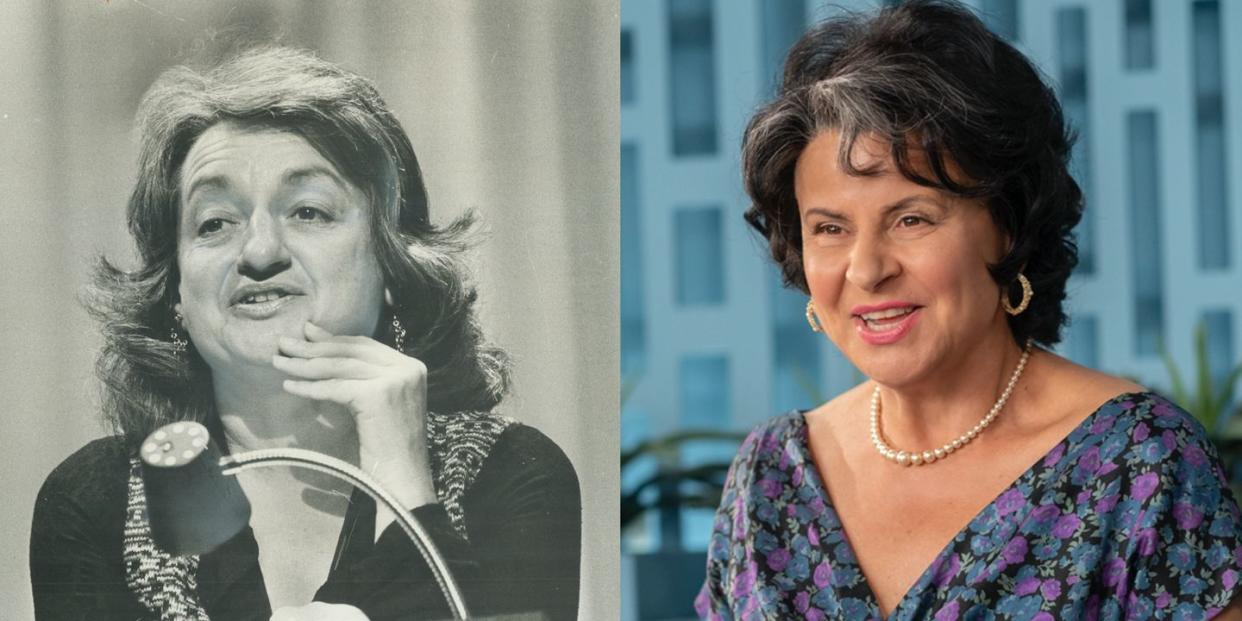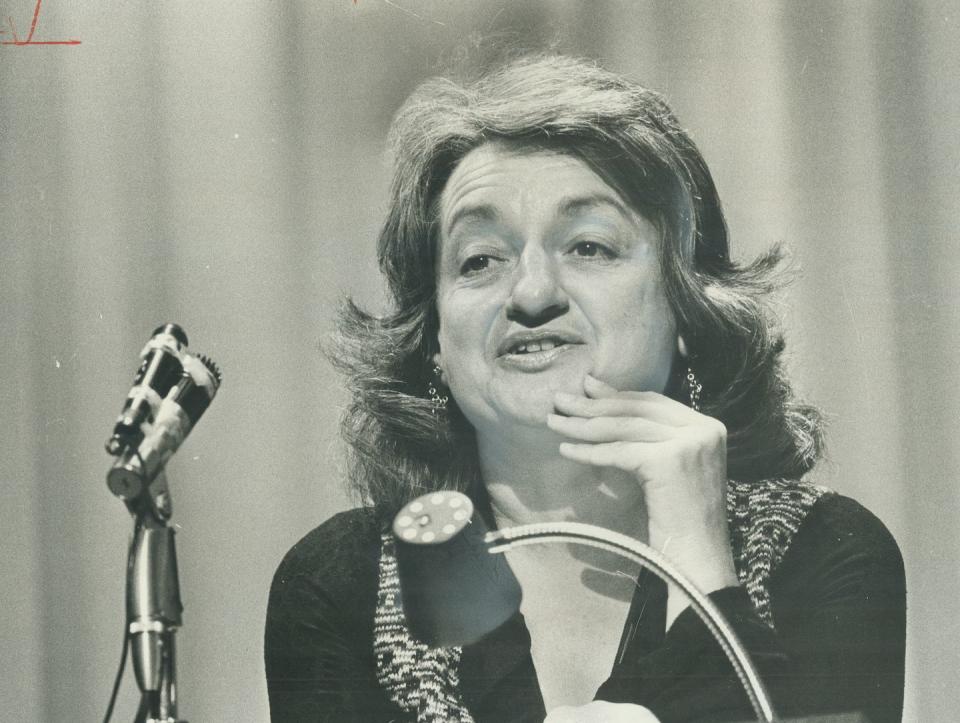'Mrs. America' Navigates Betty Friedan's Titanic Influence On Feminism

“No woman gets an orgasm from shining the kitchen floor,” Betty Friedan famously wrote in The Feminine Mystique, her landmark 1963 treatise on the plight of modern women confined to traditional roles. Friedan, often credited as the mother of second wave feminism, unmasked “the problem that has no name” with her cornerstone book, earning her a vaunted place in the history of the women’s movement. But as depicted in Mrs. America, FX’s new limited series about feminist activism in the 1970s, Friedan’s life on the frontlines of social change wasn’t without conflict—from within and without the women’s movement.
In 1921, Friedan was born Bettye Naomi Goldstein in Peoria, Illinois, where her father worked as a jeweler and her mother worked as a journalist before becoming a homemaker. After completing a summa cum laude degree in psychology at Smith College in 1942, Friedan began her training as a psychologist at Berkeley, but as World War II raged on, she became increasingly politically engaged, befriending a number of Marxists who were later investigated by the FBI. After a year in the graduate program, Friedan decamped to New York, where she spent three years as a reporter for the Federated Press. When she then took a position as a labor reporter for the union newspaper UE News, her politics drifted leftward, leading her to write pamphlets advocating for the union rights of working women.
In 1947, Friedan married theater producer Carl Friedan; in 1952, she was dismissed from her post at UE News when her employers learned that she was pregnant with her second child. In the years to follow, she worked as a freelance writer for various women’s magazines, including Cosmopolitan, while she and her husband raised their children in suburban Rockland County, New York. In the late 1950s, she began the research for what would later become The Feminine Mystique when she circulated a survey among her Smith College classmates, finding that most of them were as dissatisfied as she was with their lives as suburban housewives. In the five years to follow, she conducted extensive interviews with women across the country while also consulting with psychologists about the general “malaise” of American women.
Friedan organized her findings into The Feminine Mystique, an immediate and controversial bestseller that remains widely regarded as one of the most influential works of twentieth century nonfiction. In it, Friedan explored “the problem that has no name,” meaning the spiritual dissatisfaction that resulted from women’s forced subservience to men. Friedan argued that women as a class not only suffered from discrimination, but that they were victimized by a false system in which they were compelled to derive fulfillment, identity, and a sense of personal completion from their roles as wives and mothers. Friedan wrote of this quandary, “She was afraid to ask even of herself the silent question—’is this all’?”
The Feminine Mystique propelled Friedan to a leadership role within the women’s movement. In 1966, she co-founded the National Organization for Women (NOW), writing this mission statement for the civil rights group: “…to bring women into full participation in the mainstream of American society now, exercising all the privileges and responsibilities thereof in truly equal partnership with men.” As president of NOW, she championed initiatives for greater representation of women in government, legalized abortion, and childcare for working mothers, among other issues. In 1971, along with Congresswoman Bella Abzug, Congresswoman Shirley Chisholm, and feminist activist Gloria Steinem, Friedan founded the National Women’s Political Caucus, which was influential in striking down outdated laws surrounding pregnancy discrimination, gendered hiring practices, and pay inequality.

As the 1970s wore on, Friedan, whom The New York Times called “famously abrasive,” was often at odds with the increasingly diverse voices emerging within the women’s movement, coming under fire for focusing on issues that primarily targeted white, educated, middle-class, heterosexual women. Meanwhile, lesbian women largely disavowed Friedan when she referred to lesbian women in the movement as the “lavender menace.” Within the movement, Friedan and Steinem often butted heads, as alluded to in Mrs. America when Friedan grouses, “Is that what everyone thinks? That I’m the Wicked Witch of the West and Gloria is Glinda?”
Friedan had a fraught relationship with Steinem, as she felt her authority as the “mother” of the movement was threatened by Steinem’s growing influence and celebrity. In 1972, Friedan criticized Steinem in the press, accusing her of dismissing marriage as tantamount to prostitution. Steinem responded with a short release: “Having been falsely accused by the male Establishment journalists of liking men too much, I am now being falsely accused by a woman Establishment journalist of not liking them enough.” Mrs. America alludes to this dust-up when Friedan, seated next to Steinem on an airplane, makes an awkward apology and claims to have been misquoted.
Treat yourself to 85+ years of history-making journalism.
Subscribe to Esquire Magazine
In the same article, Friedan took an oblique swipe at Abzug, writing, “Only a female chauvinist would say that no matter how good a man's record—on peace, on women—women must support a female opponent just because she is a woman.” Abzug fired back, saying, “Once again Betty Friedan has exercised her right to be wrong. I've never asked anyone to vote for me only because I am a woman.”
Such conflict was emblematic of the growing ideological divide within the women’s movement, which was riven by differing ideas about the best path forward. Yet despite the conflict, Friedan’s influence on American feminism and American society is titanic, with her writing and activism spanning the bulk of her lifetime. Throughout the remainder of the twentieth century, Friedan wrote five additional books on gender and feminism, while also serving as a guest lecturer at various universities. In 2006, Friedan died of congestive heart failure on her 85th birthday, but her influence continues to be felt in all corners of American society. As Friedan’s neighbor on Mrs. America puts it, “We get to do what we do because she risked everything.”
You Might Also Like

